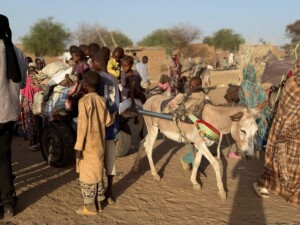Sudan: ‘GERD electric start-up a breach of legal obligations by Ethiopia’
The government of Sudan has reacted angrily after Ethiopian Prime Minister Abiy Ahmed officially inaugurated hydroelectricity production at the controversial Grand Ethiopian Renaissance Dam (GERD) on Sunday. Sudanese authorities said that the unilateral action constitutes “a fundamental breach of legal obligations” and contradicts what was agreed upon between Ethiopia, Sudan, and Egypt in the 2015 Declaration of Principles.
 Grand Ethiopian Renaissance Dam (File photo: SUNA)
Grand Ethiopian Renaissance Dam (File photo: SUNA)
The government of Sudan has reacted angrily after Ethiopian Prime Minister Abiy Ahmed officially inaugurated hydroelectricity production at the controversial Grand Ethiopian Renaissance Dam (GERD) on Sunday. Sudanese authorities said that the unilateral action constitutes “a fundamental breach of legal obligations” and contradicts what was agreed upon between Ethiopia, Sudan, and Egypt in the 2015 Declaration of Principles.
In a statement on Monday, Omer El Farouk Sayed Kamil, spokesperson for Sudan’s GERD Negotiations Team, says that “Sudan affirms its firm position in the dossier of GERD, which is the need to reach a legally binding agreement on the filling and operation of the dam. Sudan believes that its position is based on the reference of the international law and the Declaration of Principles signed in March 2015 by the three countries".
In reaction to comments by the Ethiopian PM on social media that Ethiopia believes that the GERD is a good example of the principle of cooperation for the benefit of all the peoples of the riparian countries without causing harm to any of them, Kamil says that Sudan believes that “it is necessary and important for Ethiopia to take real steps that correspond to this statement on the ground”.
Sudan confirms its stance rejecting all unilateral measures in everything related to the filling and operating of the dam, and Sudan believes that the measures that have been taken, especially the first and second filling and the latest measure related to starting the operation of electricity generation turbines, are incompatible with the spirit of cooperation and constitute a fundamental breach of legal obligations, the statement says.
“Ethiopia, thus contradicts what was agreed upon between the three countries in the Declaration of Principles".
Sudan affirms that its participation in all rounds of negotiations stems from its conviction that an agreement can be achieved that takes into account the interests of the three parties, including its important initiatives that culminated in the signing of the Declaration of Principles Agreement in Khartoum in March 2015,” the Sudanese government concludes.
Controversies
The dam, Ethiopia’s intention to fill it, and the ramifications to Sudan and Egypt downstream have been the subject of sharp and often fruitless negotiations, which are now progressing due to international efforts at mediation.
* Ethiopia began to build the GERD in 2011 at the source of the Blue Nile, near the border with Sudan, and the dam is currently in the final phase of construction. In August last year, Addis Ababa unilaterally began filling the dam reservoir.
The Blue Nile contributes approximately 85 per cent to the volume of the main Nile River. Both Egypt and Sudan heavily depend on the waters of the Nile to meet the demands of their growing populations.
The three countries signed a Declaration of Principles in Khartoum in 2015 as a basis for negotiations, but no agreement on the use of the Nile waters has been reached so far. More than once, negotiations under the auspices of the Africa Union ended in a deadlock. Recently, the EU and the USA have both expressed their willingness to mediate between the three countries.











 and then
and then